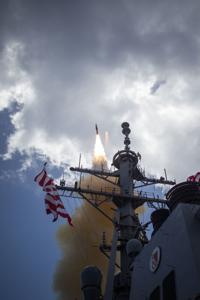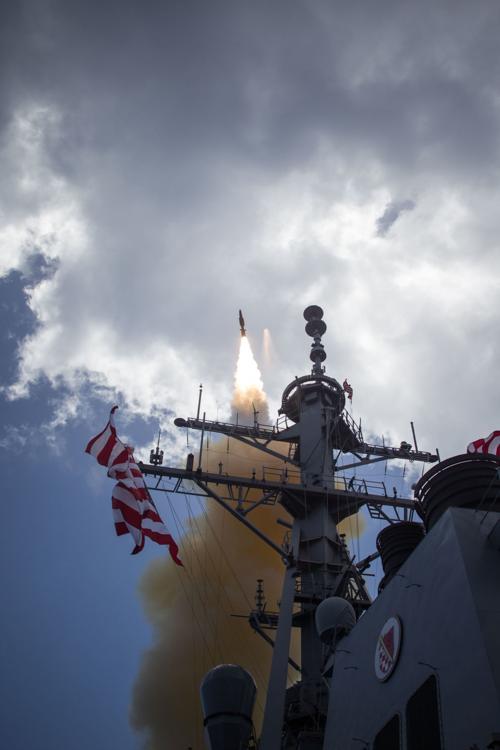Successful retesting of a ballistic missile interceptor made by Tucson-based Raytheon Missile Systems has paved the way for long-term production contracts worth more than $2 billion.
The U.S. Missile Defense Agency says it found the cause of the failure of a Standard Missile-3 Block IB missile during a complex intercept test last October and has tightened quality-control procedures to solve the problem.
The agency said the failure didn’t resurface during two successful, non-intercept test flights to of a new rocket-motor nozzle in May.
That finding will support a request for full-rate production of the SM-3 IB, part of the Aegis Ballistic Missile Defense system, though there is no firm timeline for the request, MDA spokesman Chris Johnson said.
The MDA has said it plans to buy up to 246 SM-3 Block IB missiles through fiscal year 2021 at a cost of $2.6 billion. In December, the agency awarded a contract worth $541 million for production of 52 missiles and added support work bringing the total contract value to $636 million.
But funding of that contract was held up pending a review of the Oct. 31 test failure, which was part of a complex, multi-target test. The MDA has ordered 35 SM-3 Block IBs as part of its fiscal 2017 budget request.
The MDA failure review — which included an inspection of Raytheon’s Tucson missile plant by MDA officials — found that “excessive O-ring lubricant caused an internal component to not arm during flight,” Johnson wrote in an email. An O-ring is a type of gasket or seal used between round components.
The MDA and Raytheon have implemented new testing and process controls to limit the amount of O-ring lubricant used in production to prevent future failures, and missiles completed under that regimen were used in the May test flights, Johnson said. Existing missiles will be examined during recertification, he added.
Prior to the tests in May, the SM-3 IB had been successful in seven of nine test flights, according to MDA records.
A Raytheon spokeswoman confirmed the corrective actions and said the successful tests will open up future production.
“Nothing has been found to prevent continued production of SM-3 Block IB,” Raytheon spokeswoman Amanda Schildt said. “Raytheon is working closely with the MDA to resume missile production and deliveries.”
Raytheon, Southern Arizona’s largest private employer, says it has delivered more than 70 SM-3 Block IBs to date. The Block IB missile, which adds a two-color target seeker and advanced propulsion and maneuvering capabilities to the previous SM-3 IA version, is deployed aboard some Aegis-equipped ships and is planned for a land-based system under construction in Romania.
Key components of the SM-3 Block IB missile are made in Raytheon’s Tucson-based “Space Factory,” including the missile’s avionics package, guidance section, seeker and guidance unit. Final assembly of the SM-3 IB missile takes place at Missile System’s highly automated missile plant in Huntsville, Alabama.
Meanwhile, Raytheon is working on a larger, longer-range version of the SM-3 on track for deployment in 2018. Co-developed with Japan, the SM-3 Block IIA has bigger rocket motors and a larger, improved kill vehicle that allows it to destroy threats earlier in flight and protect larger regions, Raytheon says.
Last December, the MDA awarded Raytheon a $543 million contract to procure 17 Block IIA missiles, though only $10 million was obligated at the time.
The Pentagon has requested $213 million in development funding for the Block IIA in fiscal 2017.





